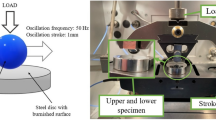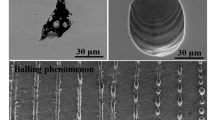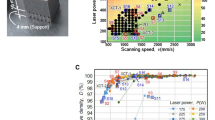Abstract
WHEN a ball is pressed into a plane metal surface, it has been shown1 that the relation : holds between the load L (kgm.) and d (mm.) the recovered diameter of the impression in the material. Both n (Meyer index) and α are constants which are dependent upon the material and its condition (annealed, cold-worked, etc.). The constant α also depends upon the size of the ball, whereas n does not.
This is a preview of subscription content, access via your institution
Access options
Subscribe to this journal
Receive 51 print issues and online access
$199.00 per year
only $3.90 per issue
Buy this article
- Purchase on Springer Link
- Instant access to full article PDF
Prices may be subject to local taxes which are calculated during checkout
Similar content being viewed by others
References
Meyer, Z., V.D.I., 645, 750, 835 (1908).
O'Neill, "The Hardness of Metals and its Measurement" (London).
Pfeil, Carnegie Schol. Mem., 16, 153 (1927).
Norbury, J. Inst. Met., 29, 407 (1923).
O'Neill and Cuthbertson, J. Inst. Met., 46, 273 (1931).
Schwarz, Forschungsarbeiten (1929).
Jones, E. R. W., unpublished work.
Author information
Authors and Affiliations
Rights and permissions
About this article
Cite this article
FINNISTON, H., JONES, E. & MADSEN, P. Meyer Analysis of Metals. Nature 164, 1128–1129 (1949). https://doi.org/10.1038/1641128b0
Issue Date:
DOI: https://doi.org/10.1038/1641128b0
This article is cited by
-
Plastic Deformation and the Meyer Constants of Metals
Nature (1952)
-
Work-hardening of Annealed Mild Steel under Static and Dynamic Conditions
Nature (1952)
-
Mayer Analysis of Metals
Nature (1950)
Comments
By submitting a comment you agree to abide by our Terms and Community Guidelines. If you find something abusive or that does not comply with our terms or guidelines please flag it as inappropriate.



